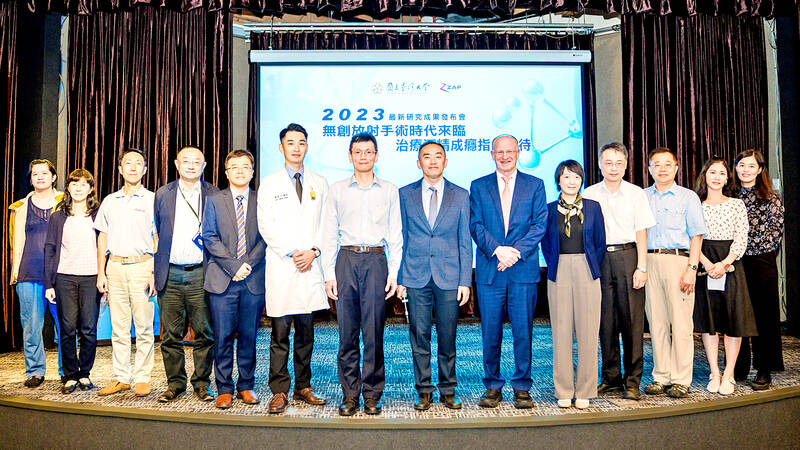National Taiwan University (NTU) yesterday said a research team, in collaboration with researchers from Taichung Veterans General Hospital and a US medical equipment manufacturer, developed a noninvasive radiosurgery system that has shown potential for treating alcohol addiction in animal experiments
Research project leader Yeh Chun-i (葉俊毅), an assistant professor at NTU’s Department of Psychology, said that alcohol is the most widely abused substance and accounts for about 91 percent of substance addiction cases, as studies suggest about 10 percent of people with long-term alcohol use might develop an addiction.
People with alcohol addiction might find themselves unable to control compulsive alcohol drinking, and it could lead to negative health and societal effects, including increased risk of cancer, liver disease and depression, as well as drunk driving, job loss, divorce and damaged family relationships, he said.

Photo courtesy of National Taiwan University
Common treatments for alcohol addiction are medication and cognitive behavioral therapy, but the effects are still limited, so some studies are turning to noninvasive neuromodulation to treat addiction, Yeh said, adding that their team developed a stereotactic radiosurgery therapy.
The therapy can deliver a low dose of acute radiation to a certain area of the brain to alter neural activity, and the low dosage is relatively free from harming the brain, he said.
Yeh said the team conducted the experiment on three pigs for two years, allowing them to press a button to drink alcohol, and that on average, they had drunk about 1.5 times the average amount as human adults who engage in excessive drinking, causing the pigs to develop an alcohol addiction.
After performing the therapy once on the pigs, the amount of alcohol intake from their voluntarily alcohol drinking reduced by 30 percent in one to three months, and then by 45 percent in seven to nine months, he said, adding that the nucleus accumbens in their brain showed no significant changes, indicating no adverse side effects.
He said that the pigs with alcohol addiction showed lower connectivity between the nucleus accumbens and cingulate cortex, but after receiving the stereotactic radiosurgery, the connectivity was partially recovered.
NTU College of Medicine’s Institute of Medical Devices and Imaging assistant professor Xiao Fu-ren (蕭輔仁), who is also a neurosurgeon at NTU Hospital, said radiosurgery was mainly used for destroying tumors in the brain as a cancer treatment, but the primary finding of their research showed that it has the potential to treat alcohol addiction or other diseases.
Additional reporting by CNA

A preclearance service to facilitate entry for people traveling to select airports in Japan would be available from Thursday next week to Feb. 25 at Taiwan Taoyuan International Airport, Taoyuan International Airport Corp (TIAC) said on Tuesday. The service was first made available to Taiwanese travelers throughout the winter vacation of 2024 and during the Lunar New Year holiday. In addition to flights to the Japanese cities of Hakodate, Asahikawa, Akita, Sendai, Niigata, Okayama, Takamatsu, Kumamoto and Kagoshima, the service would be available to travelers to Kobe and Oita. The service can be accessed by passengers of 15 flight routes operated by

GIVE AND TAKE: Blood demand continues to rise each year, while fewer young donors are available due to the nation’s falling birthrate, a doctor said Blood donors can redeem points earned from donations to obtain limited edition Formosan black bear travel mugs, the Kaohsiung Blood Center said yesterday, as it announced a goal of stocking 20,000 units of blood prior to the Lunar New Year. The last month of the lunar year is National Blood Donation Month, when local centers seek to stockpile blood for use during the Lunar New Year holiday. The blood demand in southern Taiwan — including Tainan and Kaohsiung, as well as Chiayi, Pingtung, Penghu and Taitung counties — is about 2,000 units per day, the center said. The donation campaign aims to boost

ENHANCING EFFICIENCY: The apron can accommodate 16 airplanes overnight at Taoyuan airport while work on the third runway continues, the transport minister said A new temporary overnight parking apron at Taiwan Taoyuan International Airport is to start operating on Friday next week to boost operational efficiency while the third runway is being constructed, the Ministry of Transportation and Communications said yesterday. The apron — one of the crucial projects in the construction of the third runway — can accommodate 16 aircraft overnight at the nation’s largest international airport, Minister of Transportation and Communications Chen Shih-kai (陳世凱) told reporters while inspecting the new facility yesterday morning. Aside from providing the airport operator with greater flexibility in aircraft parking during the third runway construction,

American climber Alex Honnold is to attempt a free climb of Taipei 101 today at 9am, with traffic closures around the skyscraper. To accommodate the climb attempt and filming, the Taipei Department of Transportation said traffic controls would be enforced around the Taipei 101 area. If weather conditions delay the climb, the restrictions would be pushed back to tomorrow. Traffic controls would be in place today from 7am to 11am around the Taipei 101 area, the department said. Songzhi Road would be fully closed in both directions between Songlian Road and Xinyi Road Sec 5, it said, adding that bidirectional traffic controls would